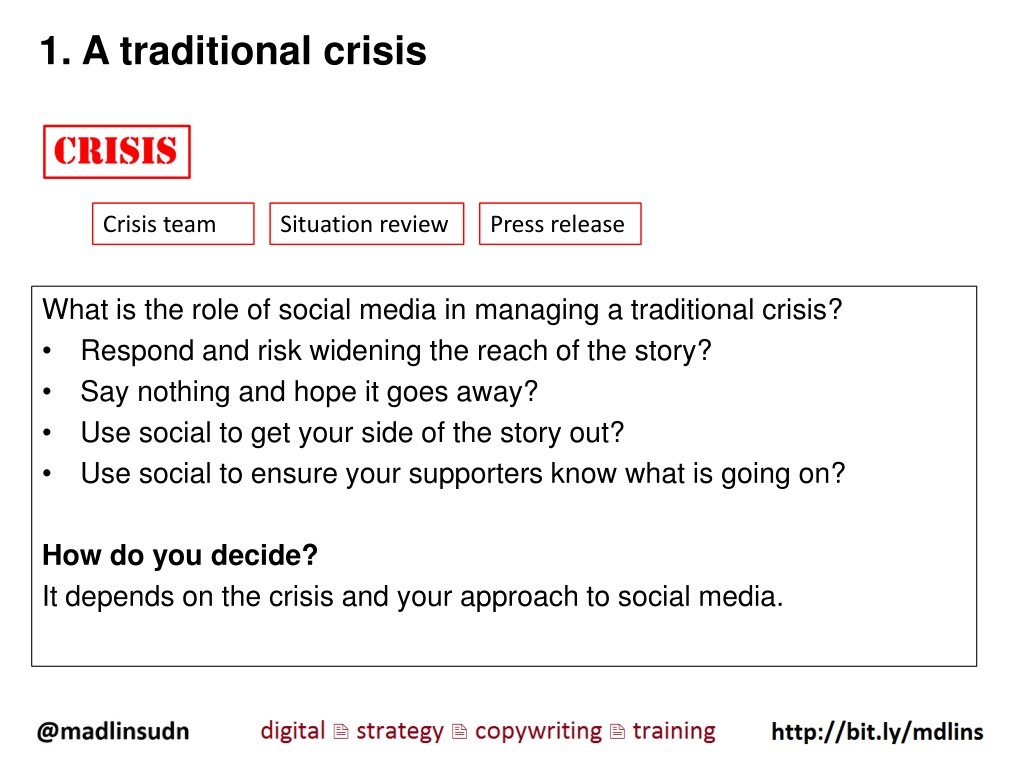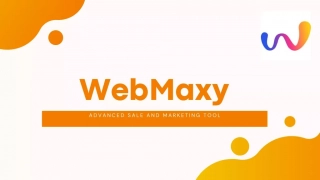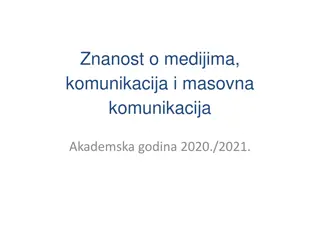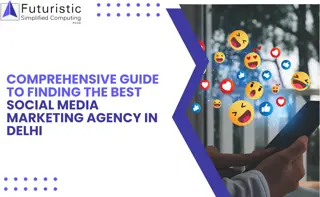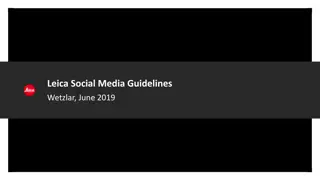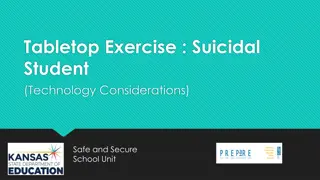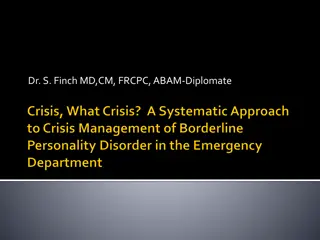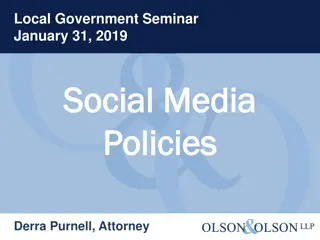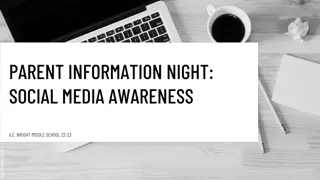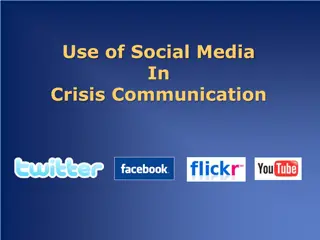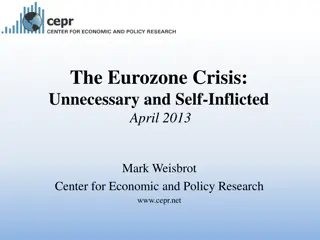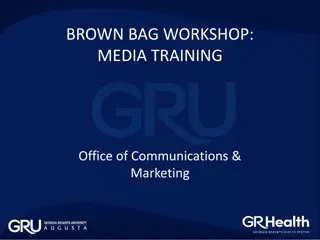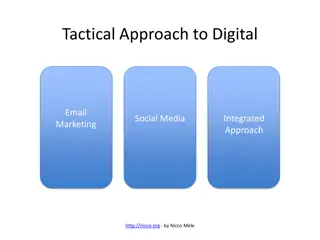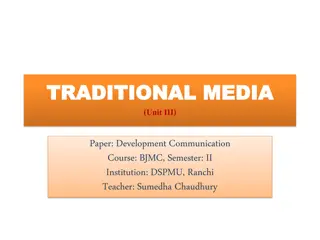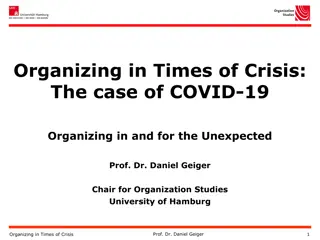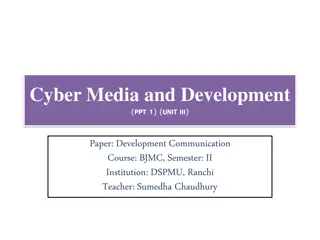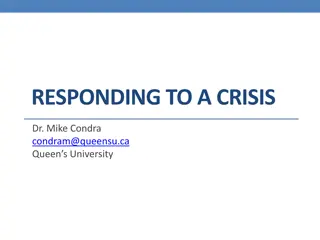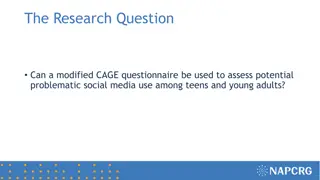Managing Traditional Crisis Situations Using Social Media
The role of social media in managing traditional crisis situations can be crucial in shaping public perception and controlling the narrative. Organizations must consider factors like the reach of the story, community support, privacy concerns, and their social media culture when deciding how to engage. This involves assessing if action is needed, monitoring public sentiment, aligning communication with organizational values, and leveraging social media creatively and responsibly.
Download Presentation

Please find below an Image/Link to download the presentation.
The content on the website is provided AS IS for your information and personal use only. It may not be sold, licensed, or shared on other websites without obtaining consent from the author. Download presentation by click this link. If you encounter any issues during the download, it is possible that the publisher has removed the file from their server.
E N D
Presentation Transcript
1. A traditional crisis Crisis team Situation review Press release What is the role of social media in managing a traditional crisis? Respond and risk widening the reach of the story? Say nothing and hope it goes away? Use social to get your side of the story out? Use social to ensure your supporters know what is going on? How do you decide? It depends on the crisis and your approach to social media.
Questions is the story out there? Do nothing Take action Is the story a fair representation of what happened? Are the facts wrong? Do you need to release your side of the story? Is the coverage high profile? And being seen by your community and funders? Do the family / those involved want privacy? Do you need to publicly say sorry or what you are doing to manage the situation? Is no one talking about it on social media? Are people talking about it on social? If so, how many and are lots of other people seeing their comments? Do you need to feel like you are owning the situation? Is the story changing or likely to change? Watch your direct mentions on Twitter / Facebook / other channels and watch for general comments without mentioning your @a/c? If they are talking about it are they being supportive or critical?
Questions whats your culture? Do nothing Take action Do you mostly operate a broadcast model of social media? Do you have an active and interactive social media following? Do your SMT avoid social media? Do your SMT get and themselves use social media? Do you have a clear tone of voice and brand on social media? Is your organisation risk-averse / cautious about social media? Do you use social media in a creative and engaging way? Are there staff / volunteers / patients who might discuss the story on their own channels? Are there staff / volunteers / patients who might discuss the story on their own channels? Do staff only work 9-5? Can the team monitor and respond out of hours? Are there people outside the comms team who could be bought in to help?
Questions whats the opportunity / risk? Do nothing Take action Will your brand be damaged if you say something? Will your brand be damaged if you say nothing? Is a statement on the website enough? Do you use social media to drive traffic to your website? Are the issues too sensitive / raw / complex to release on social? Do relatives / carers / staff need a public output for their feelings? Will the story damage fundraising? Could you use this crisis to build supporters or challenge attitudes about the work you do? Can you use social media to do something extra? Think about all your comms channels. Remember integrated comms What motivates your audience? What channels are they using?
2. Crisis in your area Local incident Local hospital closure with impact on your services Healthcare scandal Crime on your doorstep Local celebrity supporter scandal What is the role of social media in managing a local crisis? Respond and risk widening the reach of the story? Ignore, it s nothing to do with us? Use social to show solidarity / community spirit? Use social to inform a wider audience (public information)? How do you decide? It depends on the crisis and your approach to social media.
Questions whats the opportunity / risk? Do nothing Take action Will your brand be damaged if you say something? How toxic is the story? Will your brand be damaged if you say nothing? Will you be drawn in to a story you don t need to be associated with? Could you use this crisis to build supporters or educate people about the work you do? As a prominent local charity, should you be involved in local issues? As a prominent local charity, should you be involved in local issues? Does responding to this story take you away from your core work? Does responding to this story support your core work? How do you connect with local people on social? Do you listen / join in with local hashtags and events - #MyArea / #MyAreaHour What local businesses or institutions do you follow?
3. Social-first crisis A hashtag relevant to you is trending Sharp increase in your mentions why? Comments and stories from patients Something you have done on social takes off! What is the role of social media in managing a social-first crisis? Respond and risk widening the reach of the story? Ignore and hope it will go away? Seize as an opportunity to increase engagement? Chance to put social media strategy to the test. How do you decide? It depends on the crisis and your approach to social media.
Questions whats the opportunity / risk? Do nothing Take action Will your brand be damaged if you say something? How toxic is the story? Will your brand be damaged if you say nothing? Could the story be misconstrued / turn nasty / be damaging to those involved? Could you use this crisis to build supporters or educate people about the work you do? Could it run out of control? Can you stop it when you want? Will the story distract from other activity you have planned? Will the story sit fine amongst other activity? Is your social conservative in nature. You stick to what works or are only just starting to explore social media? Is your culture one of creativity and risk? You proactively look for opportunities to entertain / educate / engage you audience? Responding in a creative way to a story can boost team / patient morale. Good images are key. Social-first crisis can be an opportunity to do some profile raising.
Top tips Watch your mentions and do social listening to check what people are saying about you and the reviews you are given. Do more than broadcast - build relationships so that when a crisis happens you are in a social community. If a story is going big, recruit trusted staff in to help. Respond in an authentic, human way communicate on social in the way your communicate in real life. Drop everything to plan and respond. Find your supporters / influencers. Contact them directly asking them to publicly support you. For people who are finding out about you for the first time, post general messages explaining what you do. Publish consistent messages across your social channels, website and email newsletters. Video can be a useful tool. Use your experience and judgement. Develop your social media strategy and crisis comms plan together. Learn from a crisis document what worked well / what didn t.
